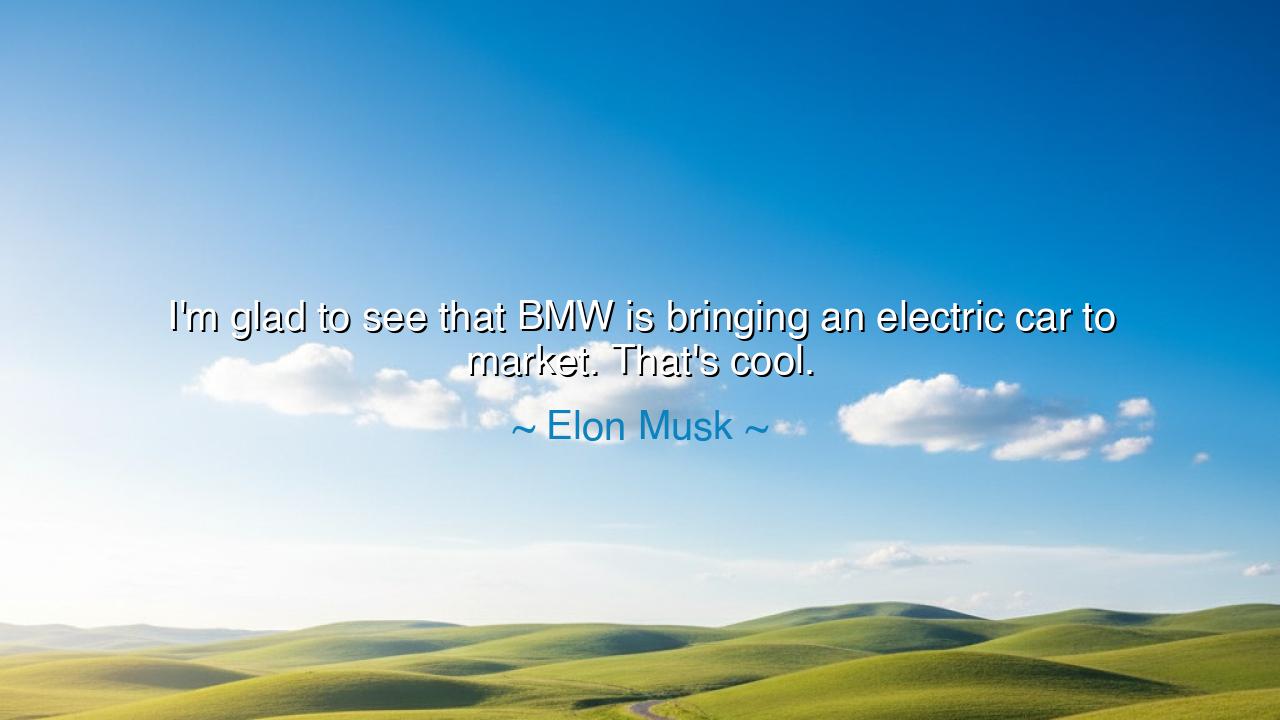
I'm glad to see that BMW is bringing an electric car to market.






"I'm glad to see that BMW is bringing an electric car to market. That's cool." – Elon Musk.
In these words, Elon Musk expresses his approval and excitement for the rise of electric vehicles and the growing movement toward sustainable transportation. His simple but profound statement emphasizes a shift in society’s attitude toward innovation and environmental consciousness. Musk’s recognition that BMW, a traditional automaker known for luxury and performance, is embracing electric technology highlights a critical juncture in the automotive industry—one where the future is not just about luxury and speed, but about sustainability and renewable energy. It is a moment when progress is no longer defined by maintaining the old, but by adapting and evolving for a more sustainable future.
The ancient world, though it did not have the technology to imagine electric cars, deeply understood the need for innovation and responsibility. The ancient Greeks, particularly those like Archimedes, who pushed the boundaries of engineering, understood that true advancement requires the courage to question existing systems and explore new possibilities. Archimedes’ famous inventions, from the Archimedean screw to war machines, were rooted in the pursuit of solving practical problems with inventive solutions. Similarly, Musk’s efforts with Tesla and the development of electric cars are born from the belief that innovation is the key to solving the most pressing challenges of the modern world, particularly those related to energy and climate change.
Consider the story of Thomas Edison, whose determination to find a viable alternative to gas lighting led to the invention of the electric lightbulb. Edison’s dedication to innovation in the face of established methods—many of which had been used for centuries—paved the way for the modern world. His vision went beyond merely improving existing technologies; it was about creating something new that could transform society. Just as Edison’s lightbulb revolutionized the way people lived, the electric vehicle represents a similar opportunity for transformation—to revolutionize how we think about transportation, energy, and our environmental footprint. Musk’s recognition of BMW’s efforts reflects a deeper truth: true progress comes from embracing new possibilities, no matter how daunting the challenge.
BMW’s decision to enter the electric car market is not simply about creating a new product, but about aligning with a global shift toward sustainable innovation. In the past, companies like Ford revolutionized the industry by making cars more accessible to the masses, shifting society’s mode of transportation. Today, Musk’s Tesla and companies like BMW are spearheading the next revolution, one that is not just about automobiles but about the future of energy. The move toward electric vehicles symbolizes the recognition that future prosperity is tied to how we use resources and how we adapt to the challenges of environmental sustainability.
This moment in history is akin to the Renaissance, when thinkers, artists, and innovators like Leonardo da Vinci sought to blend the practical and the aesthetic, creating a future where science and art were no longer separate but intertwined. The Renaissance represented a time when humanity recognized the need to embrace new ideas, to look forward, and to build a future based on innovation and reason. Just as da Vinci’s work transcended traditional boundaries, today’s innovators like Musk and BMW are tearing down the walls between industries, integrating technology, sustainability, and luxury in a way that promises to shape the next era.
The lesson in Musk’s comment is clear: the future of progress lies in our ability to embrace change and adapt to new ideas. In our own lives, we are often faced with the choice to stick with what is familiar or to innovate and take risks. The rise of electric vehicles shows us that even the most established industries are vulnerable to the changing tides of progress. As individuals, we must ask ourselves: how can we embrace innovation in our own lives? How can we contribute to the future through our own choices, whether in technology, sustainability, or personal development? Just as Musk celebrates BMW’s willingness to innovate, we too should embrace the future by acting today, taking the steps necessary to build a more sustainable, innovative, and equitable world.
In the end, Musk’s simple acknowledgment that BMW is entering the electric car market invites us all to celebrate progress, not just in terms of profit or luxury, but in terms of our collective responsibility to shape a better world. Innovation is not just a tool for personal gain, but a vehicle for global transformation, a means of addressing the challenges we face and building a brighter, more sustainable future. Let us take inspiration from the pioneers of the past and the innovators of today, and commit ourselves to the work of creating a future where progress and sustainability are the driving forces of our world.






AAdministratorAdministrator
Welcome, honored guests. Please leave a comment, we will respond soon